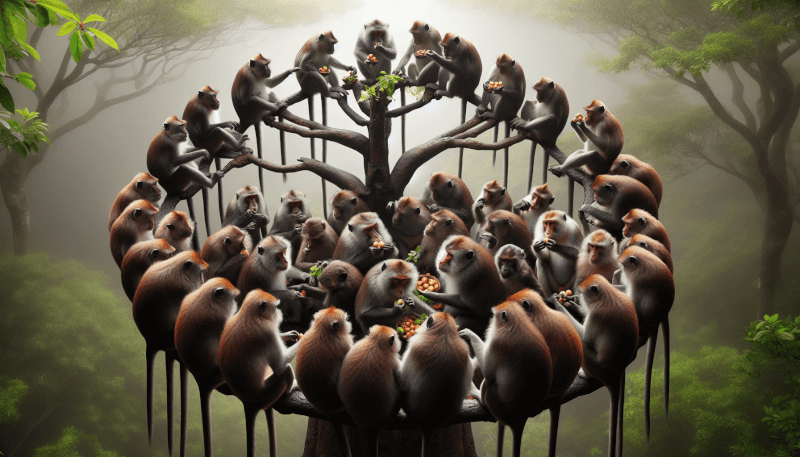Imagine you’re in the enchanting world of primates, observing their intricate social lives and marveling at their fascinating behaviors. In this article, we will explore the strategies that play a crucial role in fostering positive social interactions among these magnificent creatures. From grooming rituals to communication techniques, we will uncover the secrets behind maintaining harmonious relationships in primate communities. Prepare to delve into the captivating world of primates and discover the key strategies that promote positive social behaviors among these extraordinary creatures.

1. Understanding Primate Social Behaviors
1.1 Importance of Social Behaviors in Primates
Social behaviors play a crucial role in the lives of primates. They are highly social animals, living in complex social groups that provide them with numerous benefits. Primates engage in social interactions to establish and maintain social bonds, share resources, and protect themselves from predators. Social behaviors also contribute to their overall well-being and mental stimulation. By understanding the importance of social behaviors in primates, we can develop strategies to promote and enhance their social interactions.
1.2 Types of Social Behaviors in Primates
Primates exhibit a wide range of social behaviors, each serving a unique purpose within their social groups. These behaviors include grooming, playing, vocalizations, affiliative behaviors, cooperation, and conflict resolution. Grooming, for example, serves as a means of bonding and reducing tension between individuals. Play behaviors allow primates to develop social skills and practice important behaviors necessary for survival. By understanding the different types of social behaviors, we can create environments that enhance and encourage these behaviors among primates.
2. Socialization and Enrichment
2.1 Encouraging Group Interactions
Primates are inherently social animals, and providing opportunities for group interactions is essential to their well-being. By housing primates in suitable social groups, we can ensure that they have companionship and develop social bonds. Introducing individuals with compatible personalities and species-specific needs can facilitate positive social interactions. Additionally, providing ample social spaces and structures allows primates to engage in natural group dynamics and social hierarchies.
2.2 Providing Opportunities for Play
Play is an important aspect of primate socialization and development. Primates engage in various forms of play, including chasing, wrestling, and object manipulation. Providing them with appropriate toys and structures encourages play and helps improve their physical and cognitive abilities. Enrichment activities that promote play can include puzzle feeders, climbing structures, and interactive toys. These activities provide mental stimulation and foster positive social interactions among primates.
2.3 Implementing Positive Reinforcement
Positive reinforcement techniques can be highly effective in encouraging desired social behaviors in primates. By rewarding individuals for engaging in positive interactions, such as sharing resources or engaging in cooperative behaviors, we reinforce these behaviors and encourage their continuation. Rewards can be in the form of treats, praise, or access to preferred resources. Implementing consistent and fair positive reinforcement strategies helps create a positive social environment and strengthens social bonds among primates.

3. Creating a Secure Environment
3.1 Minimizing Stressors and Aggression
Creating a secure environment is crucial for promoting positive social behaviors in primates. Minimizing stressors, such as loud noises or sudden changes in their surroundings, helps reduce anxiety and aggression. Providing a predictable routine and stable social groups can also contribute to a sense of security. Ensuring that individuals have adequate space, privacy, and access to resources reduces competition and potential conflict among primates.
3.2 Ensuring Sufficient Space and Resources
Primates require sufficient space and access to resources to exhibit their natural social behaviors. Overcrowding can lead to increased stress and aggression. Providing appropriate enclosures with ample space for social interactions, climbing, and exploration allows primates to engage in their natural behaviors. Access to food, water, and enrichment materials should be provided in a way that minimizes competition and promotes sharing among individuals.
3.3 Establishing Safe Social Structures
Establishing safe social structures within primate groups is essential to promote positive social behaviors. This involves carefully introducing individuals into compatible groups and monitoring their social dynamics. Understanding the species-specific social hierarchies and allowing individuals to establish their roles within the group fosters a harmonious social environment. Implementing measures to prevent bullying or aggression, such as separating individuals when necessary, ensures the overall well-being of the group.
4. Understanding Social Hierarchies and Dynamics
4.1 Studying Dominance and Subordination
Social hierarchies exist within primate groups, with individuals holding different positions of dominance and subordination. Understanding the dynamics of these hierarchies is essential for promoting positive social behaviors. Dominant individuals maintain order within the group, while subordinates show deference and respect. By recognizing and respecting these hierarchies, we can foster a stable social environment and prevent unnecessary conflicts.
4.2 Promoting Fairness and Equality
While social hierarchies are a natural part of primate social structures, promoting fairness and equality is important in preventing social exclusion and maintaining positive interactions. Ensuring that all individuals have access to resources, opportunities for social engagement, and are treated with respect enables a more harmonious social environment. Fair and equal treatment among primates supports positive social behaviors and prevents individuals from feeling marginalized.
4.3 Managing Conflict Resolution
Conflict is a natural part of social interactions, even among primates. Managing conflicts in a constructive manner is crucial for maintaining positive social behaviors. Primates engage in various conflict resolution strategies, including reconciliation, mediation, and submission. Providing individuals with opportunities to resolve conflicts peacefully, while also intervening when necessary to prevent physical harm, promotes healthy social interactions. It is important to observe and understand the natural conflict resolution mechanisms of primates to effectively manage conflicts within their social groups.

5. Providing Social Learning Opportunities
5.1 Facilitating Social Observations and Imitation
Primates are highly observant and capable of learning from their social counterparts. By providing opportunities for social observations, primates can learn appropriate behaviors and social skills. Encouraging individuals to interact with more experienced or socially adept group members helps facilitate social learning. Primates often imitate the behaviors of others, so creating an environment that promotes positive behaviors and discourages negative actions can have a significant impact on their social development.
5.2 Encouraging Cooperative Problem-Solving
Cooperative problem-solving is another crucial aspect of primate social behaviors. By encouraging individuals to work together to solve puzzles or obtain rewards, we foster cooperative attitudes and enhance their problem-solving abilities. Providing enrichment activities that require joint efforts, such as food puzzles that must be solved collectively, allows primates to engage in cooperative behaviors. This promotes positive social interactions and strengthens their social bonds.
5.3 Offering Opportunities for Social Learning
Creating opportunities for social learning is essential for the overall social development of primates. This can include introducing new individuals into established groups, allowing individuals from different groups to interact, or providing socialization sessions with caretakers. Social learning helps individuals acquire new skills, adapt to changing social dynamics, and develop social bonds. Incorporating opportunities for social learning into their daily routines promotes positive social behaviors and enriches their lives.
6. Promoting Positive Relationships
6.1 Facilitating Bonding and Affiliative Behaviors
Bonding and affiliative behaviors are fundamental to the social lives of primates. By facilitating opportunities for individuals to form strong bonds through grooming, social play, and close proximity, we foster positive relationships. Providing appropriate spaces and structures that allow for physical closeness, such as platforms or resting areas, encourages primates to engage in affiliative behaviors. These behaviors contribute to a sense of belonging and well-being within their social groups.
6.2 Encouraging Mutual Grooming and Physical Contact
Mutual grooming and physical contact are essential components of primate social behaviors. By promoting these behaviors, we reinforce social bonds and reduce stress levels among individuals. Creating spaces that allow for comfortable grooming, such as providing grooming partners with secure resting areas, encourages individuals to engage in mutual grooming. Encouraging physical contact through appropriate socialization and handling techniques also supports positive relationships and enhances social interactions.
6.3 Fostering Positive Parent-Offspring Interactions
Parent-offspring interactions are critical for the social development and well-being of young primates. By fostering positive interactions between parents and offspring, we strengthen the family unit and promote healthy social behaviors. Providing appropriate nesting or resting spaces for parents and ensuring they have access to resources that support their offspring’s needs enhances their ability to care for their young. Promoting positive parent-offspring interactions contributes to the overall socialization and well-being of the group.

7. Engaging in Conservation Efforts
7.1 Protecting Natural Habitats and Resources
Conservation efforts play a vital role in promoting positive social behaviors in primates. By protecting their natural habitats and preserving their resources, we ensure the availability of suitable environments for social interactions to thrive. Implementing sustainable practices that minimize habitat destruction, deforestation, and resource exploitation supports the long-term well-being of primate populations and their social dynamics.
7.2 Implementing Primate Rescue and Rehabilitation Programs
Primate rescue and rehabilitation programs are valuable initiatives for promoting positive social behaviors. Rescuing primates from detrimental environments, such as the illegal pet trade or habitat destruction, provides them with an opportunity to experience social interactions in a safe and supportive environment. Rehabilitation programs focus on re-socializing primates and preparing them for potential release into the wild or facilitating their integration into established social groups. These programs contribute to the overall conservation of primates and promote positive social behaviors.
7.3 Educating Local Communities and Raising Awareness
Educating local communities and raising awareness about the importance of primate social behaviors is crucial for their conservation. By fostering understanding and empathy towards primates, we encourage communities to support conservation efforts and engage in sustainable practices. Educational programs can include workshops, public outreach events, and school initiatives that highlight the value of primate social interactions. By involving local communities, we create a network of individuals who actively contribute to the preservation of primate social behaviors.
8. Collaborating with Researchers and Experts
8.1 Participating in Scientific Studies
Collaboration with researchers and experts in the field of primate behavior is essential for gaining a deeper understanding of social behaviors and developing effective strategies. By participating in scientific studies, organizations and caregivers contribute valuable data that can enhance our knowledge of primate social interactions. Researchers can observe and analyze behaviors, identify patterns, and make recommendations to improve social dynamics and overall well-being.
8.2 Sharing Knowledge and Best Practices
Sharing knowledge and best practices among primate care organizations and professionals helps promote positive social behaviors. By sharing experiences, successes, and challenges, we can learn from one another and implement effective strategies across different primate populations. Knowledge sharing platforms, conferences, and workshops provide opportunities for professionals to come together, exchange ideas, and develop innovative approaches to promote positive social behaviors in primates.
8.3 Supporting Research on Primate Behavior and Social Interactions
Supporting research on primate behavior and social interactions is essential for the continued improvement of strategies. By funding and supporting research initiatives, we contribute to the advancement of knowledge in the field and the development of evidence-based practices. Research can provide insights into the specific needs and preferences of different primate species, helping organizations tailor their programs and environments to promote positive social behaviors effectively.

9. Implementing Positive Reinforcement Strategies
9.1 Reward-Based System for Desired Behaviors
Implementing a reward-based system for desired behaviors is a powerful strategy for promoting positive social interactions. By identifying specific behaviors that contribute to positive social dynamics, such as resource sharing or cooperative problem-solving, and associating them with rewards, we reinforce these behaviors. Rewards can be in the form of food treats, access to preferred resources, or social acknowledgments. Consistency and fairness in rewarding individuals for their positive behaviors establish a strong foundation for a positive social environment.
9.2 Utilizing Food Enrichment and Training
Food enrichment and training techniques can help promote positive social behaviors in primates. By providing food puzzles, hiding treats, or incorporating feeding devices that require group cooperation, we encourage individuals to engage in social interactions. Training exercises that focus on cooperative behaviors and encourage individuals to work together also contribute to positive social dynamics. Utilizing food enrichment and training as positive reinforcement tools enhances socialization and fosters positive relationships among primates.
9.3 Incorporating Interactive Toys and Games
Interactive toys and games are valuable tools for promoting positive social behaviors in primates. These toys provide mental stimulation, promote problem-solving abilities, and encourage cooperative play. Incorporating interactive toys that require joint efforts, such as puzzle feeders or toys that can be manipulated together, fosters positive interactions and strengthens social bonds. Providing a variety of interactive toys and games ensures individuals have opportunities for social engagement and promotes positive social behaviors.
10. Evaluating and Assessing Social Behaviors
10.1 Conducting Behavioral Observations
Conducting regular behavioral observations is crucial for evaluating and assessing social behaviors in primates. By observing and documenting their behaviors, social interactions, and responses to various stimuli, we can gain insights into the effectiveness of implemented strategies. Behavioral observations allow us to identify areas of improvement, identify individual preferences, and monitor changes in social dynamics. Regular evaluations ensure that strategies for promoting positive social behaviors can be modified and refined as needed.
10.2 Collecting Data on Social Interactions
Collecting data on social interactions among primates provides valuable information for assessing the success of implemented strategies. By recording social behaviors, affiliative interactions, aggression levels, and communication patterns, we can identify trends and patterns that impact social dynamics. Collecting data allows us to evaluate the effectiveness of strategies and make informed decisions to continually improve the social well-being of primates.
10.3 Analyzing Results and Identifying Areas of Improvement
Analyzing the results obtained from behavioral observations and data collection is essential for identifying areas of improvement in promoting positive social behaviors. By analyzing trends, identifying potential challenges, and recognizing successful strategies, we can make informed decisions about adjustments or modifications to current practices. This continuous evaluation process ensures that organizations and caregivers can adapt their approaches to the specific needs and social dynamics of the primates under their care.


